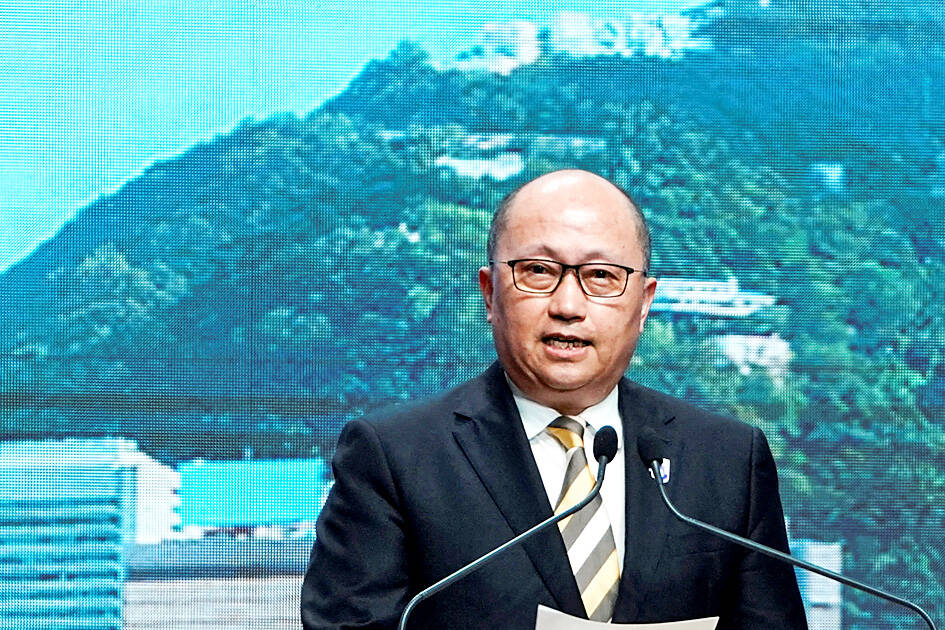Hong Kong Chief Executive John Lee (李家超) yesterday said that China’s recent removal of its top representative in the territory, known for his hardline policies on national security, had been a “normal” personnel change.
In a surprise development, China announced late on Friday that Zheng Yanxiong (鄭雁雄), the director of China’s Liaison Office in Hong Kong — Beijing’s main representative office in the territory with powerful oversight over local affairs — had been “removed” from his post.
He was replaced by Zhou Ji (周霽), a senior official with the Hong Kong and Macau Affairs Office on China’s State Council.

Photo: Reuters
Zheng, who played a key role in the crackdown on Hong Kong’s democratic movement in the past few years, was also stripped of his role as China’s national security adviser on a committee overseeing national security in Hong Kong.
No explanation by Beijing or Chinese state media was given for the change.
A person with knowledge of the matter said that Hong Kong-based CK Hutchison Holdings Ltd’s (長江和記實業) proposed sale of its global port network to a consortium initially led by US firm Blackrock had caught senior Chinese leaders “by surprise,” as they had not been informed beforehand and Zheng was partly blamed for that.
The person, who has spoken with the liaison office, declined to be identified as the discussions were confidential.
The liaison office gave no immediate response to faxed questions from Reuters.
Zheng had served in the post since January 2023 and while the position has no fixed term, his tenure was shorter than predecessors, including Luo Huining (駱惠寧) and Zhang Xiaoming (張曉明).
“The change of the liaison office director is I believe, as with all changes of officials, very normal,” Lee told reporters during a weekly briefing, without being drawn on reasons for the reshuffle.
“Director Zheng has spent around five years [in Hong Kong]. Hong Kong was going through a transition period of chaos to order,” Lee said, referring to the months-long pro-democracy protests that erupted across the territory in 2019 while adding that he looked forward to working with Zhou.
CK Hutchison’s ports deal has been criticized in Chinese state media as “betraying” Beijing’s interests and bowing to US political pressure.
Asked whether Zheng’s removal reflected a pivot by Beijing toward economic development from national security, Lee said Hong Kong still needed to pursue both.
“Hong Kong faces a stage where development and safety must be addressed at the same time because any development must have a safe environment,” he said.
China promulgated a powerful national security law in 2020, arresting scores of opposition democrats and activists, shuttering liberal media outlets and civil society groups, and punishing free speech with sedition — moves that have drawn international criticism.

CROSS-STRAIT COLLABORATION: The new KMT chairwoman expressed interest in meeting the Chinese president from the start, but she’ll have to pay to get in Beijing allegedly agreed to let Chinese Nationalist Party (KMT) Chairwoman Cheng Li-wun (鄭麗文) meet with Chinese President Xi Jinping (習近平) around the Lunar New Year holiday next year on three conditions, including that the KMT block Taiwan’s arms purchases, a source said yesterday. Cheng has expressed interest in meeting Xi since she won the KMT’s chairmanship election in October. A source, speaking on condition of anonymity, said a consensus on a meeting was allegedly reached after two KMT vice chairmen visited China’s Taiwan Affairs Office Director Song Tao (宋濤) in China last month. Beijing allegedly gave the KMT three conditions it had to

STAYING ALERT: China this week deployed its largest maritime show of force to date in the region, prompting concern in Taipei and Tokyo, which Beijing has brushed off Deterring conflict over Taiwan is a priority, the White House said in its National Security Strategy published yesterday, which also called on Japan and South Korea to increase their defense spending to help protect the first island chain. Taiwan is strategically positioned between Northeast and Southeast Asia, and provides direct access to the second island chain, with one-third of global shipping passing through the South China Sea, the report said. Given the implications for the US economy, along with Taiwan’s dominance in semiconductors, “deterring a conflict over Taiwan, ideally by preserving military overmatch, is a priority,” it said. However, the strategy also reiterated

‘BALANCE OF POWER’: Hegseth said that the US did not want to ‘strangle’ China, but to ensure that none of Washington’s allies would be vulnerable to military aggression Washington has no intention of changing the “status quo” in the Taiwan Strait, US Secretary of Defense Pete Hegseth said on Saturday, adding that one of the US military’s main priorities is to deter China “through strength, not through confrontation.” Speaking at the annual Reagan National Defense Forum in Simi Valley, California, Hegseth outlined the US Department of Defense’s priorities under US President Donald Trump. “First, defending the US homeland and our hemisphere. Second, deterring China through strength, not confrontation. Third, increased burden sharing for us, allies and partners. And fourth, supercharging the US defense industrial base,” he said. US-China relations under

The Chien Feng IV (勁蜂, Mighty Hornet) loitering munition is on track to enter flight tests next month in connection with potential adoption by Taiwanese and US armed forces, a government source said yesterday. The kamikaze drone, which boasts a range of 1,000km, debuted at the Taipei Aerospace and Defense Technology Exhibition in September, the official said on condition of anonymity. The Chungshan Institute of Science and Technology and US-based Kratos Defense jointly developed the platform by leveraging the engine and airframe of the latter’s MQM-178 Firejet target drone, they said. The uncrewed aerial vehicle is designed to utilize an artificial intelligence computer